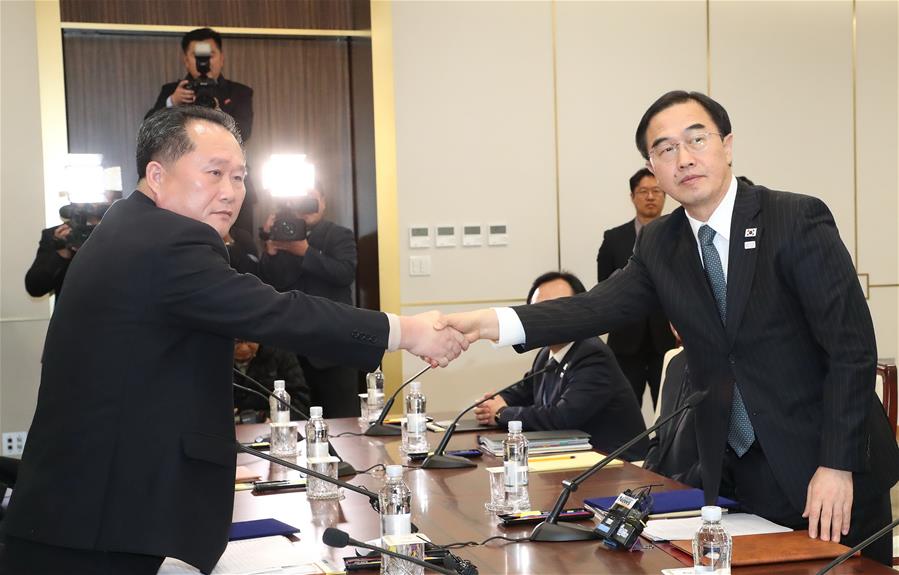
Ri Son-gwon (L), chairman of the Committee for the Peaceful Reunification of the Fatherland of the Democratic People's Republic of Korea (DPRK), shakes hands with South Korean Unification Minister Cho Myoung-gyon at Peace House, a South Korean building in the truce village of Panmunjom, Jan. 9, 2018. The Democratic People's Republic of Korea (DPRK) and South Korea have agreed at the just-ended inter-Korean dialogue to hold separate military talks, with the DPRK also consenting to send a delegation to the 2018 Winter Olympics to be hosted by Seoul next month, Seoul's Unification Ministry said Tuesday. (Xinhua/Newsis)
SEOUL, Jan. 9 (Xinhua) -- The Democratic People's Republic of Korea (DPRK) and South Korea have agreed at their just-ended inter-Korean dialogue to hold separate military talks, with the DPRK also consenting to send a delegation to the 2018 Winter Olympics to be hosted by Seoul next month, Seoul's Unification Ministry said Tuesday.
The senior-level, inter-governmental dialogue between the two Koreas, the first in about two years, was held in the truce village of Panmunjom, a breakthrough in improving inter-Korean relations and building peace on the Korean Peninsula.
After the talks, the two sides adopted a three-point joint statement, agreeing to cooperate with each other for the 2018 Winter Olympics and Paralympic Games to be held in South Korea's eastern county of Pyeongchang in February and March respectively.
Under the agreement, the DPRK will send to the events its National Olympic Committee delegation, athletes, cheering squads, performing arts teams, press corps and demonstration teams for taekwondo, the traditional martial art of the two Koreas.
South Korea promised to provide accommodation for the DPRK Olympic delegations and agreed to hold work-level talks on the DPRK's participation in the winter sports event.
The communications channel in the liaison offices of the two Koreas in Panmunjom, which sits in the middle of the heavily guarded inter-Korean land border, was restored last week, making direct dialogue between the two governments possible.
The hotline between the two military authorities was also reopened. During the talks, the DPRK informed South Korea that it had reopened the hotline, which was confirmed by South Korea later in the day.
The inter-governmental and military hotlines were severed by the DPRK when South Korea shut down the inter-Korean industrial zone in the DPRK's border town of Kaesong in February 2016 in response to Pyongyang's fourth nuclear test.
Seoul and Pyongyang also decided to hold separate military talks after agreeing that they should make joint efforts to ease military tensions, create a peaceful environment on the Korean Peninsula, and promote reconciliation and unity of the two Koreas.
To promote reconciliation and unity between their people across the border, they agreed to activate contact, exchanges and cooperation in diverse areas.
Under the three-point agreement, South Korea and the DPRK will honor the declarations they made in the past, and resolve all issues in inter-Korean relations through talks and negotiations.
They agreed to hold talks in different areas, along with the high-level dialogue, to improve inter-Korean relations.
The dialogue at Peace House, a building controlled by South Korea in Panmunjom, lasted for over 10 hours.
The South Korean delegation was led by Unification Minister Cho Myoung-gyon, while the five-member DPRK delegation was headed by Ri Son-gwon, chairman, Committee for the Peaceful Reunification of the Fatherland.
After the dialogue, Cho told reporters that the talks were significant for restoring and developing inter-Korean relations with the two sides agreeing to advance bilateral ties based on mutual respect.
He said the talks provided an opportunity to ease tension on the Korean Peninsula by securing the DPRK's participation in the Winter Olympics.
During the dialogue, South Korea proposed Red Cross talks -- talks between the Red Cross agencies from the two Koreas -- to reunite separated families, which was not mentioned in the three-point agreement.
People from the two Koreas have been banned from visiting and contacting each other since the 1950-53 Korean War ended with an armistice, not a formal peace treaty.















